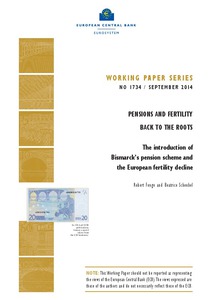Pensions and fertility: back to the roots - The introduction of Bismarck's pension scheme and the European fertility decline
"Fertility has long been declining in industrialised countries and the existence of public pension systems is considered as one of the causes. This paper provides detailed evidence based on historical data on the mechanism by which a public pension system depresses fertility. Our theoretical fr...
| Main Authors: | , |
|---|---|
| Institution: | ETUI-European Trade Union Institute |
| Format: | TEXT |
| Language: | English |
| Published: |
Frankfurt am Main
2014
ECB |
| Subjects: | |
| Online Access: | https://www.labourline.org/KENTIKA-19116008124919342809-Pensions-and-fertility-back-to.htm |
| Summary: | "Fertility has long been declining in industrialised countries and the existence of public pension systems is considered as one of the causes. This paper provides detailed evidence based on historical data on the mechanism by which a public pension system depresses fertility. Our theoretical framework highlights that the effect of a public pension system on fertility works via the impact of contributions in such a system on disposable income as well as via the impact on future disposable income that is related to the internal rate of return of the pension system. Drawing on a unique historical data set which allows us to measure these variables at a jurisdictional level for a time when comprehensive social security was introduced, we estimate the effects predicted by the model. We find that beyond the traditional determinants of the first demographic transition, a lower internal rate of return of the pension system is associated with a higher birth rate. This result is robust to including the traditional determinants of the first demographic transition as controls as well as to other policy changes at the time." |
|---|---|
| Physical Description: | 49 p Digital |

